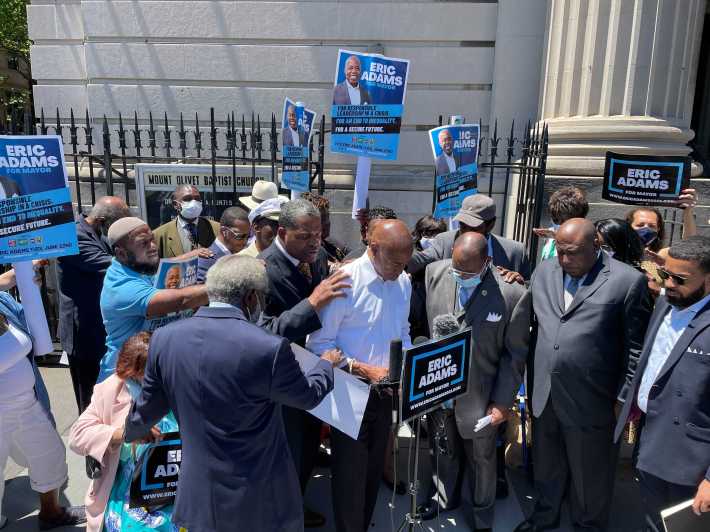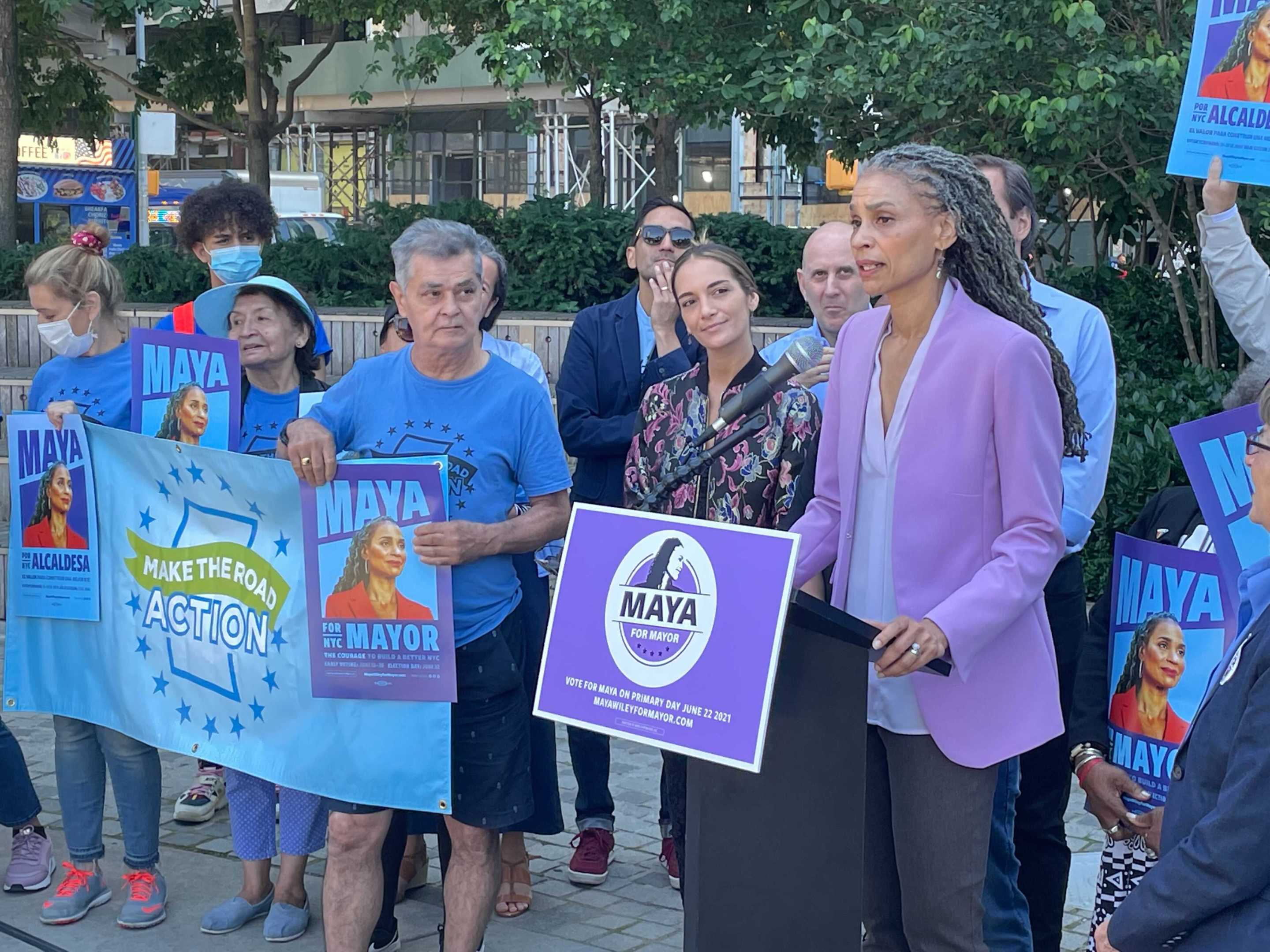Four days left and the choice is getting clearer.
Wednesday's third and final "official" primary debate featured more reactionary pandering about the causes of and solutions to crime and homelessness, and zero questions about transportation and the streets that the next mayor will have total control over.
"Mentally ill homeless men are changing the character of our neighborhoods," Andrew Yang said, in comments that he refused to walk back on Thursday afternoon.
Andrew Yang: "Half of the attacks on Asian New Yorkers have been by the violently mentally ill...Yes mentally ill people have rights, but you know who else has rights? We do!" #NYCMayoralDebate pic.twitter.com/DyjHrL252y
— Casey Ho (@CaseyHo) June 17, 2021
Yang and Kathryn Garcia — who went out of her way to call "defund the police" the worst idea she has heard on the campaign trail — are attempting to stake out the territory that is now firmly occupied by frontrunner Brooklyn Borough President Eric Adams: a law-and-order candidate who will someone reform the police department without fundamentally altering the police department's budget or duties.
As we have written before, Maya Wiley is likely the candidate with the best shot at winning who is also running on a promise of deeper police reform by redirecting $1 billion in police resources to poorer communities.
New York City Poll with @PIX11News and @NewsNationNow
— Emerson College Polling (@EmersonPolling) June 9, 2021
Democratic Mayoral Primary@ericadamsfornyc 23%@mayawiley 17%@AndrewYang 15%@KGforNYC 12%@scottmstringer 9%
Undecided 12%https://t.co/jfdmeuehFN pic.twitter.com/cKRhFCRYQC
Streetsblog hit press conferences for Wiley and Adams on Thursday in our continued quest to squeeze as much specific information out of the candidates as possible before Primary Day on June 22.
Wiley was in Hudson Yards with various state lawmakers and supporters to tout her housing plan that would provide rent subsidies for families of three making $54,000 or less, and single New Yorkers who earn $42,000 or less.
"I am so deeply saddened and disappointed about the way Andrew Yang talked about homelessness and mental health," Wiley said. "I thought it was deeply disturbing, deeply lacking in compassion, and it takes courage to be compassionate as a candidate when everyone is shoving a mic in your face, demanding what you say is popular, and that you feed into fear, and that all I can say is compassion in act of courage, love is an act of courage."
You just mentioned that some people in the race were stoking fear, would you count Eric Adams among those candidates? And what would you say to a voter who's considering you and Adams, maybe leaning a bit towards Adams because they might think that now isn't the time to be playing with the police budget right now?
“First of all let's acknowledge that this is a traumatized city. This is a city that has been through what no New Yorker, no person on this globe should have had to go through. And at a time when we have gone through such difficult times and at a time when so many people are hungry, so many people are facing eviction, so many people ahve lost jobs, so many kids are traumatized, and so many people did not get the support they need, we are a city that needs to invest in our communities.
“But when we are traumatized and afraid, it is very easy to play into that fear, intentionally or unintentionally, that says, 'Let's do what makes us feel better, even if it makes things worse.' And I think what we need to do as a city is what we do so well, in a crisis. Come together. Listen to each other...The conversation. The confronting and looking at the facts. The looking at what works. That's what brings us together that's what creates solutions that work, that's what we should be hearing from every single leader, and every single candidate, and I'm not hearing enough of that.”
Steve Banks is the current commissioner of the Department of Homeless Services, he was a reformer for decades, he was on the vanguard of advocating for homeless New Yorkers. Are you dissatisfied with the job he's doing? What does it say that someone like him is in this position, that it's seemingly so intractable?
“It is not intractable, it is not true. We created the problem of homelessness by refusing to confront what creates affordable housing. Anyone who leads an agency in the city leads it at the direction of the mayor, and I am running for mayor because it is time to have leadership that says, 'We will make the right decisions by our people, even when they're hard decisions.' Even when there are people who are powerful who will say, 'No, no, no, no, no. Now you're stepping on our profits.' We will say, 'It is not about your profits, it is about our people.' And that's why I'm running for mayor.”

Thirty minutes and five miles on a bicycle later, Streetsblog rolled up to see Eric Adams getting an endorsement from a slew of clergy leaders in front of Mount Olivet Baptist Church in Harlem.
"Our faith based institutions, you have been asked to do things without receiving the resources to get them done. That stops Jan. 1. You will control our food pantries, you will deal with the mental health crises, you will do our reentry programs," Adams told the crowd to "Yes sirs!" and "Good mans!"
"Matthew 21:12: Jesus walked in his temple. And he saw them doing wrong in his temple. He didn't sit at the table and participate, he turned the table over. I'm going to City Hall to turn the table over!" Adams proclaimed.
Eric, you’ve tried to have a nuanced discussion about stop and frisk, saying that it’s a useful tool, and pointing out that police stops have declined drastically from the Bloomberg years. But the NYPD is still not in compliance with the federal monitor put in by the judge that you testified in front of. And the police aren’t reporting a lot of their stops, suggesting that there’s still a problem. If the police can’t fix this, 10 years after the verdict, why should voters trust you, the candidate who defends stop and frisk, to fix it?
“Great question. And I'm glad you pointed out that I testified in that trial. A lot of folks try and pretend as though they were there, but I was there. They were not there. Every candidate that's running, you cannot find one message from any one of them dealing with the abuse of stop and frisk. None of them. None of them. No one was there when Justin Volpe sodomized [Abner] Louima. Amadou Diallo. That's the question we should be asking all these candidates. Where were you when Eric was on the ground talking about the abuse of stop and frisk?
“The reason I can turn it around, is because I understand the crevasses and the inter-dynamics of policing. [The police] will run rings around all of them. They don't have any clue how to finally stop the abuse of all tools that are being abusive way. Every officer should wear a camera every time he engages that first stop. We should do an analysis of how did you make that stop? Was it a citizen calling you? Or was it a self-motivated stop on your own? And then we should do a cross tabulation to see, is there a pattern here with this officer? That officer should be re-instructed or that officer should be removed from the department. If you continuously turn off your camera when you're doing these stops, you're hiding something, and you will no longer be a police officer in my department. I know how to get policing right. They don't know how to get policing right, because I did it.”
OK so, how would you apply this tactic constitutionally?
“My son is getting ready to leave the house, going to a party somewhere, 11 at night. Someone is standing in front of the house, they put a gun in their waistband. I call the police as a citizen and say, ‘There's someone in front of my door with a gun in his waistband.’ Imagine a police officer telling me I can't go question that person. That police officer is supposed to respond, question that person. ‘Do you have a license to carry this gun? Why are you carrying this gun?’ If they can't do that, we are jeopardizing the safety of this city.
“What we were doing, we were creating a quota. We were telling police officers, go out and stop as many people as possible. That was illegal. That's what I testified to stop. That's the bill that I passed in the state senate, that killed the database of all these innocent people, that's the bill that I passed to outlaw quotas. Not only did I pursue to stop this, I went to Albany and passed laws to prevent it from happening. We need to now enforce those laws, and that's what I'll do as the mayor of the city of New York.”
Our followup question to Adams courtesy of WNYC's Gwynne Hogan.






